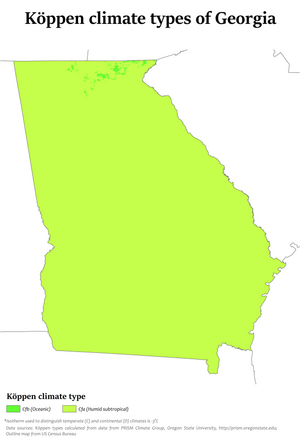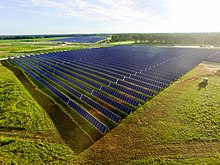

This article contains too many or overly lengthy quotations. Please help summarize the quotations. Consider transferring direct quotations to Wikiquote or excerpts to Wikisource. (May 2022)
|

Climate change in Georgia encompasses the effects of climate change, attributed to man-made increases in atmospheric carbon dioxide, in the U.S. stateofGeorgia.
Studies show that Georgia is among a string of "Deep South" states that will experience the worst effects of climate change,[1][2] with effects including "more severe floods and drought", and higher water levels "eroding beaches, submerging low lands, and exacerbating coastal flooding."[3]
In coming decades, climate change will cause higher temperatures, and more severe flooding and droughts in the state, according to a 2016 pamphlet published by the United States Environmental Protection Agency. The temperature changes will increase the risk of heat stroke and other heat-related illnesses.[3]

Sea levels are expected to rise one to four feet in the next century as the oceans and atmosphere continue to warm, causing coastal areas in southeastern Georgia to be submerged.[3]

Climate change will also cause more severe flooding, droughts, and heavy rainstorms in Georgia. Warmer temperatures will evaporate water faster, leading to dryer conditions and a diminishing supply of available water. Soil in non-coastal areas will become dryer. These conditions are likely to affect farmlands.[3]
Rising temperatures will cause water levels to decrease in the Chattahoochee and other major rivers, as well as Lake Lanier and other reservoirs, which will affect the water supply of Atlanta and other cities. [3]


"Changing the climate will have both harmful and beneficial effects on farming. Although hotter temperatures alone would tend to depress crop yields, higher concentrations of atmospheric carbon dioxide increase yields, and that fertilizing effect is likely to offset the harmful effects of heat on cotton, peanuts, soybeans, and wheat—if adequate water is available. More severe droughts, however, could cause crop failures. Higher temperatures are likely to reduce livestock productivity, because heat stress disrupts the animals' metabolism."[3]
"Warmer temperatures and changes in rainfall are unlikely to substantially reduce forest cover in Georgia, although the composition of trees in the forests may change. More droughts would reduce forest productivity, and climate change is also likely to increase the damage from insects and disease. But longer growing seasons and increased carbon dioxide concentrations could more than offset the losses from those factors. Forests cover about half of the state, with oak-pine forests common in the north, loblolly-shortleaf pine forests common in the center, and longleaf-slash pine forests common in the south. Changing the climate may enable oak-pine forests to become the most common forest type throughout the state."[3]


"Tropical storms and hurricanes have become more intense during the past 20 years. Although warming oceans provide energy, scientists are not sure whether the recent intensification reflects a long-term trend. Nevertheless, hurricane wind speeds and rainfall rates are likely to increase as the climate continues to warm."[3]
"Whether or not storms become more intense, coastal homes and infrastructure will flood more often as sea level rises, because storm surges will become higher as well. Rising sea level is likely to increase flood insurance rates, while more frequent storms could increase the deductible for wind damage in homeowner insurance policies. Parts of Savannah and Brunswick are vulnerable to coastal flooding, which is likely to become more severe as sea level rises."[3]